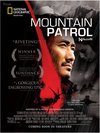 Walking and Talking (Nicole Holofcener, 1996)
Walking and Talking (Nicole Holofcener, 1996)I didn't even realize this was coming up in my Netflix queue when I went to see Friends With Money last week, but it was a nice surprise since I liked Friends With Money and I always like these talky indie dramedies about relationships. This is Holofcener's first film, and I thought it was better than Friends With Money overall, albeit a little rough around the edges at times. It was nice to see Catherine Keener playing someone who wasn't so dour, and Anne Heche without the baggage of all her tabloid adventures. Holofcener is really good at portraying genuine, unforced female friendship, and her characters are natural and appealing. She's only got one other film I haven't seen - Lovely & Amazing - and I added it to my queue right after watching this one.
 Mountain Patrol: Kekexili (Lu Chuan, 2004)
Mountain Patrol: Kekexili (Lu Chuan, 2004)This movie was supposed to open in Vegas this Friday, so I watched it over the weekend and wrote a review. All of a sudden it's now not opening here at all (this sadly happens more than you might imagine), but I spent the time writing the review so it's going to get published, even if it's only on here. This is what you would have read in Las Vegas Weekly this week:
In the remote mountains of Tibet, poachers hunt the Tibetan antelope for its pelts, which command a high price in foreign markets. Outlawed by the Chinese government, the practice remains widespread in 1996 as only a band of civilians, the mountain patrol of the title, stand between the antelope and their predators. When the poachers kill one of the volunteer patrolmen, reporter Gayu (Zhang Lei) is sent from Beijing to cover the story.
Stepping off the bus from the big city, Gayu is like someone transported from another world. His baseball cap and modern camera clash with the primitive environment of the mountain village, but he throws himself into his reporting, tagging along with the single-minded patrol leader Ritai (Duobuji) and his crew as they venture into the harsh mountains to track the elusive poachers.
The trip, which starts out as exciting and upbeat, quickly takes a dark turn, and Ritai becomes Captain Ahab-like in his obsession with catching the poachers’ ringleader. Writer-director Lu Chuan, loosely basing the story on a real patrol that protected the antelopes until 2001, delves deeply into the violence that people inflict upon each other in the name of ideals that quickly become moot. The patrol’s efforts are nearly futile, not only because they can’t catch the poachers, but also because they have no authority to arrest them; they can only confiscate the pelts, some of which they shamefully end up selling to make up for funding that the government doesn’t provide.
As the patrol makes its way deeper and deeper into the unforgiving landscape, the cause they are fighting for drifts further and further from the everyday realities of simply surviving against the elements. Lu shoots some incredibly beautiful landscapes that give you a sense of the enormity of the terrain, and how alien it must be to someone like Gayu, used to modern city living. Ultimately, though, what makes the film strong is not its unique portrait of life in rural Tibet, but the way it effectively conveys universal truths about people’s capacity for cruelty.
No comments:
Post a Comment